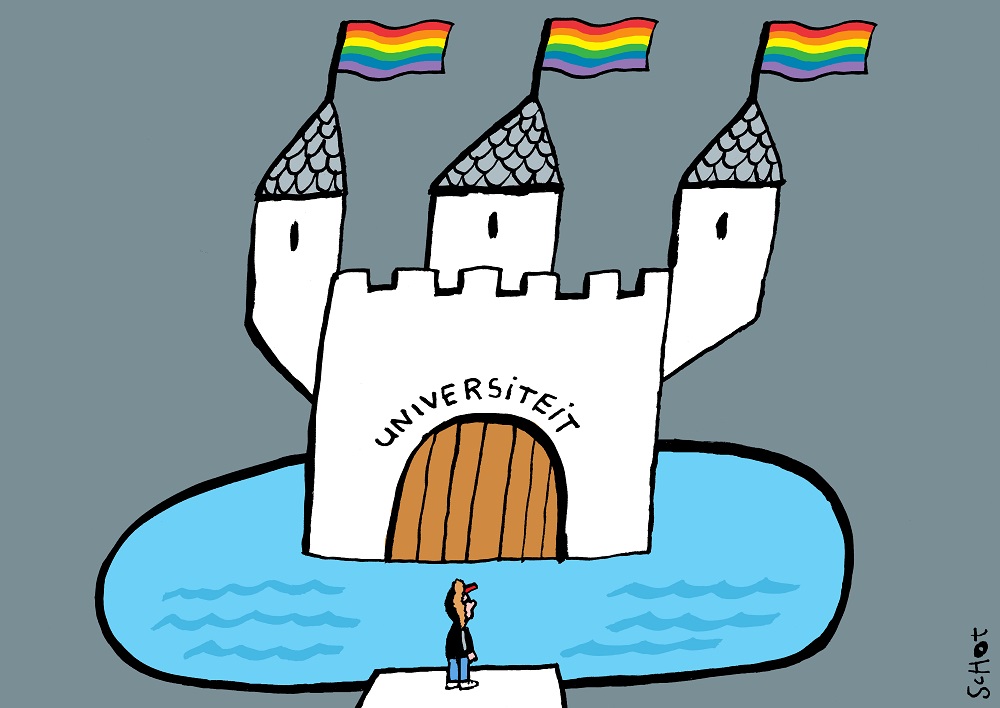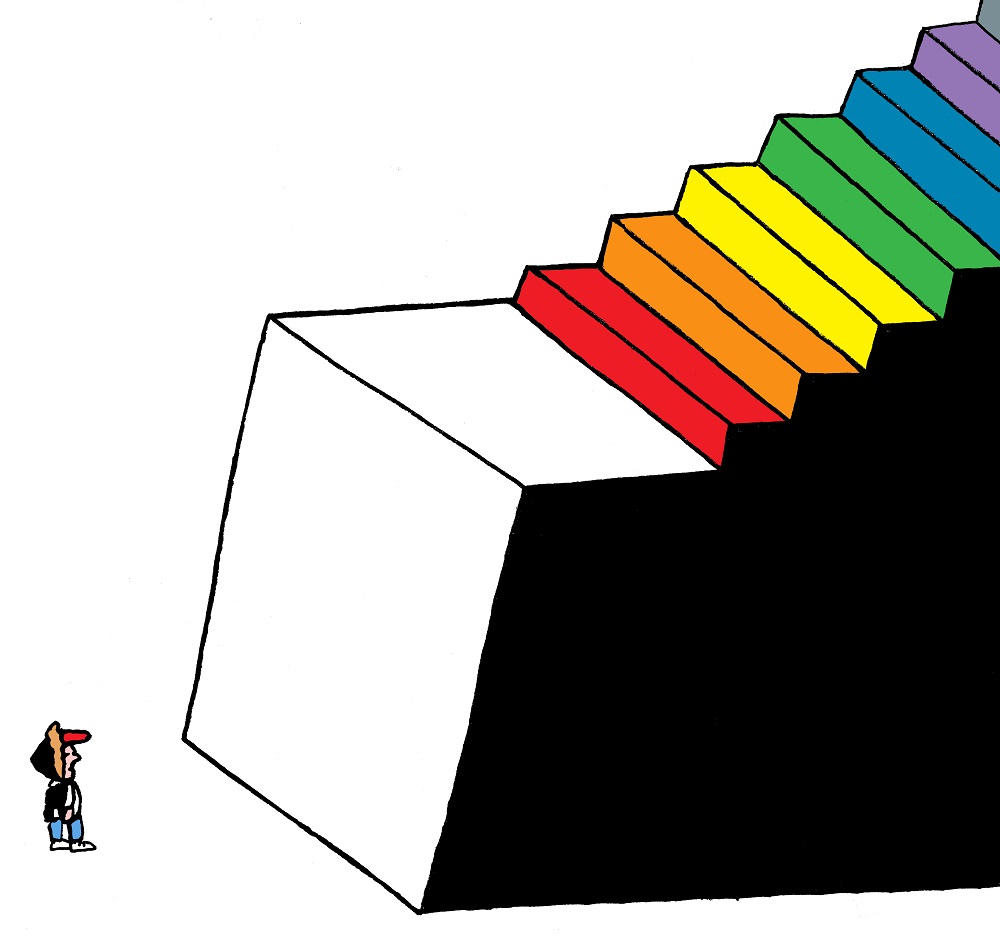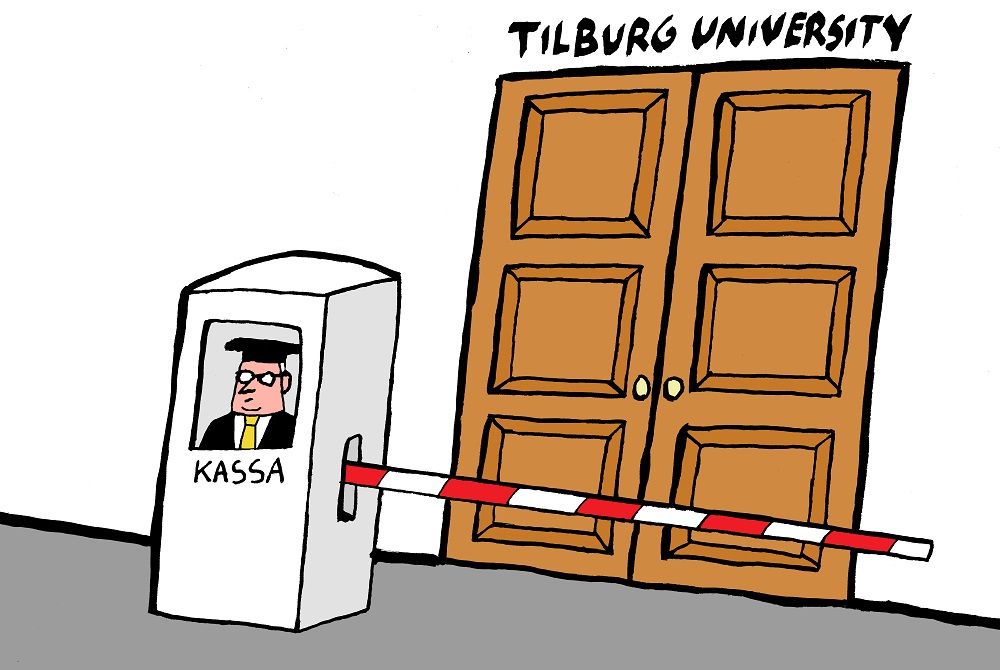Diverse? Why you don’t see fur-trimmed collars on campus
Diverse and inclusive, that is what Tilburg University wants to be. So rainbow flags are hoisted and courses in intercultural communication are given. But if you want to talk about diversity, you also have to talk about class.

Anyone walking around the Tilburg campus will see it immediately: diversity thinking has settled here as well. The rainbow flag flies proudly in front of the Cobbenhagen Building, next to the flags of Europe and the university. And if you want to cross the footbridge to the library, you first have to climb the steps of the rainbow stairs.
However, those who visited the campus at lunchtime before the coronavirus situation could not escape the impression that the student population is less diverse than the rainbow flag suggests. Among students, the male to female ratio is equal now. But there are still few people of color to be spotted on the boulevard that runs from the Academy Building to the library.
There is also little diversity in socio-cultural terms. Lots of blouses, but few fur-trimmed collars.
Respect for everyone
The rainbow flag was first raised on October 11, 2019, on Diversity Day, followed, six months later, by the rainbow stairs. “We do this to show that we are an inclusive university,” said Vice-President Paulina Snijders at the time (Dutch only). “Whether you are a student or employee, lesbian or gay, whatever the color of your skin, and whether you speak Dutch, English, or Brabants: we need you all at our university.’
That an inclusive university needs more than rainbow colors alone, Tilburg University also knows. The university has not been idle in recent years. With the Philip Eijlander Diversity Program, money has been made available to get more women in full professor and associate professor positions. Intercultural communication training courses are being taken among the staff. Currently, there are discussions within the University Council about the possible establishment of an anti-racism working group.
In response to the Black Lives Matter protests last year, the university emphasized it again in an official statement, “Our university rejects any form of racism and discrimination and stands for diversity and inclusion.”
Fine words, fine actions.
And yet.
The campus remains a predominantly white and privileged environment. Suburban residents of any color or gender rarely walk around with a student ID in their pockets.
Talking about class
Diversity thinking is often about culture and rarely about the wallet. Yet, promoting diversity and inclusiveness is more than debunking stereotypes, counting ethnicities and putting women in top-level jobs. Diversity and inclusiveness also have a socioeconomic dimension. Income, origin, environment, and upbringing: these are all determining factors. When you talk about equality, you also talk about class.
For young people from the lower classes of society, whether they have a migration background or not, that wallet is the first and biggest obstacle to an equal society. That and the almost obsessive emphasis universities place on success and succeeding.

This is often forgotten, yet here lies the opportunity to make diversity more than a buzzword for people who are already at the top and would like to stay there. A truly diverse and inclusive university is an accessible university. One that actively promotes social mobility and also has room in the lecture hall for first generation students from Tilburg-Noord or Broekhoven.
Castles with expensive entrance tickets
Especially when it comes to accessibility, Dutch universities—Tilburg University included—have compromised a lot the past decade. Universities are increasingly becoming castles with expensive entrance tickets and a towering set of requirements that is reaching frightening proportions.
For students, it is no longer enough to get your degree with good grades. You will have to be your own entrepreneur, a one-person business that is open twenty-four hours a day; otherwise, that piece of paper is not worth nearly as much at the end of the day.
“A truly diverse and inclusive university is an accessible university”
Thus, academia has become quite intimidating. Especially if you come from a family that goes through the supermarket’s weekly offer leaflets looking for meat and detergent, and whose parents have never seen the inside of a university.
Universities are simply at the top of the education system, some will say. That involves a certain level and to get there you have to make an effort. Absolutely true. But the expensive entrance tickets and sky-high demands now have a discouraging and repellent effect on anyone who is slightly less sure of him/herself. As if the drawbridge in front of the castle is not lowered whilst saying, everyone is welcome, but you have to be able to afford a boat to get across the moat.
Student debt is growing
The most obvious bomb under the accessibility of universities has of course been the introduction of the student loan system. With the abolition of the basic grant, studying has become a lot more expensive. Instead of student grants, students can take out an interest-bearing loan since September 1, 2015.
Let’s just do it, Education Minister Jet Bussemaker (Dutch only) thought in 2012. “If we keep saying that borrowing is very bad, without giving the nuances, then we are really going to make students afraid to start studying.” Later, after the introduction of the student loan system, Education Minister Ingrid van Engelshoven concluded that things were fine, in fact. According to research, the transfer from HAVO/VWO to university had not really changed.
But now, the CBS predicts that the average student debt will be 25,000 euros because of the student loan system. A hefty increase, with all consequences that entails. Especially middle-income earners will have to dig deep into their pockets to be able to pay for the studies of one or more children. Students are stressed by debts, according to research (Dutch only) from the Dutch National Student Association (Interstedelijk Studentenoverleg (ISO)). They are also more pessimistic about the future: it is more difficult to get a mortgage later. And job-hopping from temporary contract to temporary contract while paying off your debt? Not really an attractive perspective.

Meanwhile, rent for student rooms and tuition fees have increased as well. And what if you want to do a second study program? Then universities are allowed to charge the so-called institutional fees and the cash register starts ringing. The amounts vary per program but can easily run into ten thousand euros.
Just a diploma is not enough
Being able to pay for a study program or being willing to take on a large debt is one thing. Successfully completing your studies is another. Because, if you manage to get over the hurdle of the binding study advice (42 credits) in the first year and then progress to the diploma, you are not there yet. Employers are cherry picking and students know that.
Just a Bachelor’s degree or a Master’s degree is not distinctive enough. You are expected to do an internship during your studies, even entry-level jobs ask for relevant work experience. These days, building a resume starts even before your working life has really begun. A board year or volunteer work? Yes please! International experience: an absolute must, after all, you are a cosmopolitan. And only one diploma? You can do better than that. Many students aim for two Master’s degrees.
“There is no room for students who obtain their diplomas by the skin of their teeth”
Universities like to capitalize on this. They want “ambitious” and “excellent” students. On the website, Tilburg University presents itself as a university for “responsible and entrepreneurial thinkers.” According to the Tilburg Educational Profile, the students who study at Tilburg University are educated to become knowledgeable, self-aware, and engaged academics, who understand society and want to play a role in it, driven by solidarity, entrepreneurship, a sense of responsibility, and empathy.”
Making mistakes
Everything indicates that there is no room for students who obtain their diplomas by the skin of their teeth, but who are the first in their families to have an academic education. Failure, making mistakes, making a slip, a wrong turn? Preferably not. All that takes time. As a student, you have to be a successful entrepreneur.
Tessa Leesen, Academic Director of the University College in Tilburg, also pointed this out in an opinion article (Dutch only) n Trouw. “When breaking fresh ground, the chance of making blunders increases, and young adults do not always have enough resilience to deal with that adequately,” she writes. Core of her argument: teach young people that it is okay to make mistakes. Or, in other words, “Don’t judge me by my success, but by the number of times I’ve fallen and got back up.”
More international and elite students
The class problem in education occurs not just at the national level. It is a global problem. The increasing internationalization of universities is a double-edged sword. Yes, someone from Bolivia can now study in Tilburg, or vice versa. Universities are accessible to students from all over the world. For good reasons, Tilburg University proudly writes on its homepage, “more than one hundred nationalities create a vibrant international community.”
“No wonder diversity policy is seen by some as a plaything of the elite. Everyone is equally important, but not everyone is allowed to participate”
However, this internationalization comes at a price. Would you like to study in Tilburg as a student from outside the European Union? Then you may, depending on the program, easily pay about 9,000 euros in tuition fees. It may be clear: it is again the wealthy who travel to Tilburg. Meanwhile, internationalization has made English the language of instruction at Tilburg University and other universities: for many young people from the lower classes this is also a serious barrier.
Similarly, internationalization is also reinforcing the elitist nature of universities. If these are to become truly inclusive and accessible to all, major changes will have to be made. Changes that universities cannot bring about on their own and for which The Hague must also be involved.
At the end of the rainbow
Overall, universities are contributing to the deepening dichotomy between higher educated and lower educated people in the Netherlands, and beyond. The two groups are increasingly set against each other. In this respect, the academic world is not really progressive. Instead of opening its doors widely, it is increasingly distancing itself from society. No wonder that diversity policy is seen by some as a plaything of the elite. Everyone is equally important, but not everyone is allowed to participate.
How do we make the university truly inclusive? Abolishing the student loan system is an obvious point. And who knows, with the new government this may come to pass. But more can be done and more needs to be done. Bring down tuition fees, or even abolish them altogether. Sounds like a breath of fresh air? Germany has no tuition fees for state universities, only a so-called semester fee of between two hundred and four hundred euros, which often includes free public transportation.
Investing more in mentors and student psychologists would be a good step, as would smaller lecture halls. More scholarships for international students from poor(er) countries. What would also help: if universities put a little less emphasis on success and a little more on support.
How does the fairy tale go again? At the end of the rainbow, there is a pot of gold. Currently, those who study will mainly find a high student debt, a lot of stress, and an uncertain future at the end. The pot of gold, you have to bring that yourself. For many, this is sufficient reason never to start the journey.






